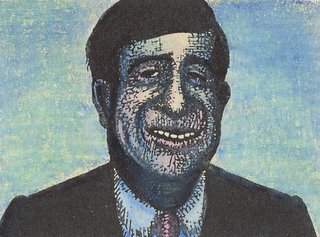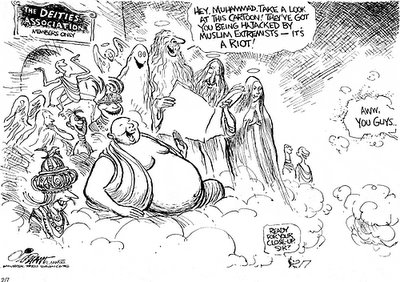by F.T. Rea
The meanderings of international affairs have at last strayed into my bailiwick, my natural field of expertise -- unreality.
Cartoons by sarcastic European artists, designed to ruffle feathers, have flushed out a shockingly angry response that seems to be feeding on itself. Peace-loving folks everywhere are bewildered, wondering how far this absurd momentum will take us. It's 2006, already, and adults are killing each other over cartoons. What’s next?
 The Cartoon War:
The Cartoon War:
"Ye gods and little fishes!" Rebus exclaimed. "Called up from the cartoon reserves at my age!"Most Americans are probably surprised by riots over edgy art. Not me. There’s plenty of precedent for it. In the interest of full disclosure, I’ve known since the third grade that a cartoon mocking a thin-skinned bully can start a fistfight.
As a kid, I was a self-appointed cartoon critic who adored
Heckle and Jeckle. Loathed
Chip ‘n’ Dale. Loved
Pogo. Hated
Peanuts. Dug salty
Popeye. Cringed at wimpy
Mickey Mouse. Cartoons were close to my heart. Growing up in Richmond I had the good fortune to see
Fred O. Seibel’s elegant work on a regular basis, as he was the world class political cartoonist in residence at the Richmond Times-Dispatch. Subsequently, at 17, my first published work was a caricature of Hubert Humphrey.
So my fascination with political art was stoked at an early age. Eventually, I came to admire renown political cartoonists such as
Herbert Block (Herblock),
Bill Mauldin,
Thomas Nast,
Honore Daumier and other masters of the genre. My favorites list is too long for this space, however, the father to all of them was
Francisco de Goya. He stunned viewers in the early-1800s who had never seen war portrayed as horror, set in an un-glorious context.
Political art, by its very nature, has always stirred passions. It has galvanized movements and spawned flare-ups of violence aplenty. How Goya got away with his unprecedented depictions of blood-lust and lost souls during the French occupation of Spain baffles me. Take
a look at some of it, you’ll see what I mean. Daumier was thrown in jail six months for
mocking the king with his deft pen.
OK, so what’s my cartoonist’s take on the controversy raging over depictions of a certain Middle Eastern prophet, you-know-who? Like, whose side am I on?
Ha! The cartoonists, of course, but they are hardly blameless.
What about the big picture? Who is right, or wrong? The provocative publishers of the cartoons? Or those who call for restraint in that area? What about those laughing at, or those taking offense from, or those ignoring the infamous cartoons in question?
Well, it appears to me all sides have legitimate points worth considering. Since real consideration would call for actually listening to the other guy -- the rube, the infidel, the jackanapes -- that's not happening. Thus, the cauldron of ill humors bubbles across the pond, while cynical Americans awash in culture of casual rough talk and obnoxious information are baffled.
Yet, in America, we have our share of violent gangs and lathered up religious extremists, too. You can get killed in some neighborhoods for wearing the wrong color. So the first thing America ought to do is get off its high horse when viewing this curious story, one that may evolve into a larger story.
Should the European publishers simply back off? Is that still a possibility? They may be in a position called “zugswang” in the game of chess. The term means it is your turn and any move with any piece only makes matters worse.
Perhaps the determined publishers should get more creative, find a way to use levity to promote a better understanding of the beauty of both freedom of speech and good manners. Still, the cartoon publishers do have a valid point when they claim religious hardliners are trying to chill freedom of expression.
To go secular, America's never-ending brouhaha over flag-burning may shed some light on an aspect of truth. To me, the burning of Old Glory in protest of government policy is obviously an act of political speech, so our national custom allows for it. The Constitution still protects it. OK, burn the flag at your anti-war rally. If, on the other hand, you schlep it over to the American Legion Hall to set it ablaze in the parking lot, don’t ask me not to laugh if an old veteran rolls up his sleeves and makes you sorry you did it.
However, the offended vet is hardly justified to beat the rude flag-burner to death. Enough is enough. So, if the outraged Muslims want to hurl insults across borders at the publishing provocateurs, or organize an economic boycott, or even throw up a picket line somewhere, that’s fine. But killing people over insulting cartoons can’t be justified by serious people in a civilized world.
An impartial witness might ask: where are the moderate Muslim leaders, cool heads who could do much with this opportunity to demonstrate the difference between the troubling fringes of the vast Islamic world and its calm center? A sincere peacemaker might ask: why such universal virtues as “prudence” and “civility” seem lost to all sides in this noisy clash of cultures? A good detective might ask, who stands to gain from inciting more riots?
An artist at the drawing board might ask how to inform the viewer it’s supposed to be a picture of you-know-who without a caption? So is the problem really more with words than pictures? Otherwise, it could be a picture of
Mr. Natural or a cat in ZZ Top.
Some say the cartoon riots have peaked and the controversy will all blow over fast. We’ll see, but I doubt that. I suspect this rhubarb has too many players still convinced they can profit from perpetuating, even exacerbating it.
Hopefully, after the cartoonists’ ink, mixed with the blood of the zealots and the unlucky bystanders, is hosed off the streets, the witnesses left standing will have developed a greater appreciation for tolerance. That, and the eternal value of a sense of humor.
-- 30 --
 At happy hour, after a round of Frisbee-golf, I was exchanging stories with a friend at the bar. After some talk of photography and sports, one story led to another and I told him about an old retired Navy lifer I’d met 30 years ago in Maine, who, working completely alone, had built an impressive two-story house for his pretty young wife from Brazil. The old salt got a kick of mystifying his listeners, by refusing to tell all concerning how he did it by himself.
At happy hour, after a round of Frisbee-golf, I was exchanging stories with a friend at the bar. After some talk of photography and sports, one story led to another and I told him about an old retired Navy lifer I’d met 30 years ago in Maine, who, working completely alone, had built an impressive two-story house for his pretty young wife from Brazil. The old salt got a kick of mystifying his listeners, by refusing to tell all concerning how he did it by himself.






















